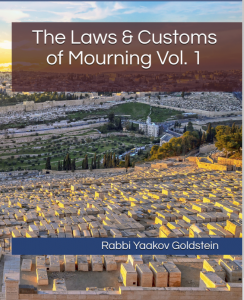
This article is an excerpt from our Sefer
Audio from 5779
Visiting grave after seven years of absence:[1]
Some are accustomed that if one did not visit the grave of a parent within seven years then he may not do so any longer.[2] Others[3] are only careful after ten years of absence. Some Poskim[4] argue that one may visit a parent’s grave even after absence of many years and there is no need to be particular in the above. Practically, it is permitted to visit a grave of a parent even after the passing of seven years.[5] Nevertheless, when seven years have passed, it is customary to send a messenger [such as the grave keeper] to the grave prior to the child’s visitation, to inform the parent that his child is coming to visit.[6] Likewise, the child is to separate charity in honor of the parent prior to visiting.[7]
Grandparents and other relatives:[8] The above custom is only with regards to the grave of a parent, however the grave of a grandparent or other relative may be visited even initially after many years of absence.
| Summary: One who has not visited the grave of a parent in seven years is to send a messenger to the grave to notify the parent of his arrival. Likewise, he is to give charity prior to the visitation. |
______________________________________________________________________________________
[1] See Nitei Gavriel Aveilus 2 85/5-12
[2] Custom recorded in Tirosh Veyitzhar 146; Dudaei Sadah 38; Mishmeres Shalom Hei 132 [however states that if never went before then permitted]; Maharam Brisk 44; Poskim in Nitei Gavriel ibid footnote
The reason: The reason for this is due to worry that the parent will be particular over the fact the child has not visited in so long and may even cause a persecution against the child above. [See Dudaei Sadeh ibid; Pnei Baruch 37 footnote 47]
Women: See Nitei Gavriel 84/9 for a dispute regarding if this applies also to married women who did not visit. See Igros Kodesh 24/338 which involved a question from a woman. It is however unclear if she was single or married.
[3] Afrasakta Deanya 168 in name of Divrei Chaim, however only regarding if all sons did not visit; Poskim in Nitei Gavriel ibid 84/5 footnote 6
[4] Darkei Chaim Veshalom 1012; Shem Mishimon 14 based on story in Zohar; Yosef Daas 355 based on fact Kaleiv visited Kivrei Avos after ten years; Yalkut Daas Vadin p. 159; Hisorerus Teshuvah Y.D. 187; Gesher Hachaim 29/16; Divrei Yoel 104; Poskim in Nitei Gavriel ibid 84/5 footnote 8
[5] Likkutei Sichos 20/647; Toras Menachem 3/267 “The custom used to be not to visit and now the custom is to visit after sending a messenger” [printed in Shulchan Menachem 5/328]
[6] Tirosh Veyitzhar 146; Hisorerus Teshuvah Y.D. 187; Poskim in Nitei Gavriel 85/11 footnote 15; Likkutei Sichos 20/647 “Some are accustomed to send a messenger and give charity even though this is not necessary”; Toras Menachem 3/267 “The custom used to be not to visit and now the custom is to visit after sending a messenger”; [printed in Shulchan Menachem 5/328] This advice was not mentioned in Igros Kodesh 24/338
[7] Likkutei Sichos 20/647 “Some are accustomed to send a messenger and give charity even though this is not necessary”; Igros Kodesh 24/338 “Give charity before and after. [printed in Shulchan Menachem 5/328] In the above letter [Igros Kodesh 24/338] the Rebbe advised a woman who had not visited the grave in seven years to a) immerse in a Mikveh that day, before going. b) Fix the Matzeiva or a matter of the like; c) Give charity before and afterwards.
[8] Tirosh Veyitzhar 146; Dudaei Sadah 38; Poskim in Nitei Gavriel 85/12 footnote 17



Leave A Comment?
You must be logged in to post a comment.